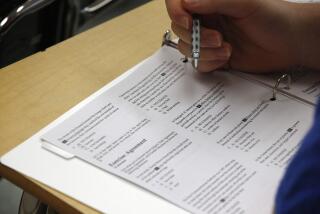Op-Ed: How the college admissions scandal helped me appreciate my tiger parents
No child’s first choice of a Christmas present would be “1001 SAT Words” and underwear. But that’s what I got the year I was 10. My parents came to the U.S. as Korean War refugees, and the gifts represented what they considered most important: education and primary needs.
As a child, I broke curves on tests and studied instead of going out with friends. I had an index card posted over my typewriter, HARVARD ‘86!!! because that’s what my two older brothers had done. I remember PTA meetings in which teachers pleaded with my parents to let me just relax and play. But that wasn’t going to happen.
As a teen I “rebelled” by surreptitiously sending an essay to Seventeen magazine and getting it published. My parents feared it might mean I was losing focus on my science track, though my father consoled himself that it might help my Harvard application. It didn’t. I attended Brown University after being rejected from Harvard, which broke their hearts.
I’ve regaled friends for years with stories about my parents’ excessive ambition for their children. But last week’s news about how dozens of wealthy, scheming white parents (and one Asian dad) allegedly approached college admissions for their kids has helped me appreciate my tiger parents.
One benefit of my upbringing was that when I got to college, I had a work ethic and a belief in myself. I needed it.
Prosecutors described bribery, faked disabilities, substitute test-takers, and Photoshopped pictures of kids pretending to be athletes – all part of alleged attempts by parents to buy their children admission into top-tier schools, including Yale and Stanford.
As a child, I wanted desperately to fit in. Being part of the only family of color in a Minnesota mining town made that hard. And the stigma was compounded by my having to stay in after school and on weekends to study and complete the additional work my father assigned to make up for schools he thought were far easier than those in Korea.
Math was always a sore subject. I had little aptitude for it, but my parents pushed me onto the honors track, where I took analytic geometry as an elective “fun” class. Almost everything post-algebra stymied me. You can’t fake your way through integrals and logarithms. I begged my parents to let me just stay on the regular math track as I feared I was nearing a nervous breakdown.
My father’s reply was always, “Sorry, Charlie” (cribbed from a TV ad at the time, in which Charlie the Tuna was rejected by StarKist because he just wasn’t good enough). Having encountered racism early on in Jim Crow Alabama in the ’50s, the lessons my parents took away from that experience were that we had to do better than whites, be incontestably great. The message about skipping out on math was clear: I had to work harder.
This is why it is so painful to learn that the college admissions system hardly resembles the meritocracy I’d imagined. The indictment describes how some kids didn’t even have to show up for their SAT exams because others took the exam for them. When I took it, my father had to take a day off of work to drive me an hour away to the next town.
I didn’t have any famous people to write my letters of recommendation – in fact my counselor wrote mine. Having never been asked to write an Ivy League recommendation, she didn’t understand I’d waived my right to see it, and obligingly made me a copy of it after she sent it. I was aghast to see she had mixed me up with my younger sister and wrote about different extracurriculars; seeing her mistakes always made me wonder a bit about my Harvard rejection.
I have often made gentle fun of my parents’ obsession with education. This scandal has helped me to see their efforts as the expression of love they were. As immigrants and refugees, they had no resources to give me other than the time and attention to my education. Teachers sometimes criticized my upbringing as “unnatural,” but the details revealed in Tuesday’s indictment were far more unnatural. They make clear that my parents’ obsessive strategy was a rational and smart choice given the horribly unlevel playing field.
One benefit of my upbringing was that when I got to college, I had a work ethic and a belief in myself. I needed it: Even as valedictorian, I was seriously under-prepared for college by my Midwestern public high school. My four years of German classes didn’t even qualify me for skipping beginning German, and even though my parents took me to the library weekly, from which I’d bring home books in Hefty garbage bags, I was staggered by how much I hadn’t read. But having been tiger-parented into college, I had the foundation – the underwear, so to speak – to get through.
Currently, a group of Asian American students who were rejected by Harvard, not unlike me, are suing, accusing the university of discriminating against Asian Americans in favor of black and Latino affirmative action candidates. The truth is, however, that it’s not blacks and Latinos who benefit from a rigged admissions process: Overwhelmingly, it’s rich, mediocre whites who feel entitled to their place as a kind of birthright, that earning it is irrelevant.
Enter the Fray: First takes on the news of the minute »
Elite education, like healthcare, is a limited resource. Why in a rational world would we waste precious resources on someone like actress Lori Loughlin’s daughter Olivia Jade, who was admitted to USC as a crew athlete even though she didn’t row. The hundreds of thousands of dollars her parents are accused of spendingto bribe admissions officials for an underachiever who publicly stated, “I don’t know how much of school I’m gonna attend.” She was looking forward, she said, to “game days” and “partying.” A few days later, she apologized for the remarks, but it’s hard not to think the money spent on getting her into school could have been much more profitably used to fund a dozen “Dreamer” immigrant students.
An acquaintance, trying to reach me through an old email, laughed recently at my newest “.edu” incarnation, Columbia. “You are such an Ivy League snob!” she exclaimed, not exactly meanly, but not nicely, either. I felt a gut-punch that I’m sure many people of color who have had elite educations would recognize. Did people think I was a snob? Did I really deserve the opportunities I’d been given? Was I a fraud?
I somehow doubt that the kids who get into top schools because of white privilege ask themselves those questions — maybe now they will start.
Marie Myung-Ok Lee has taught writing at Yale, Brown, and Columbia. Her novel “The Evening Hero” will be published in 2020. @MarieMyungOkLee
More to Read
A cure for the common opinion
Get thought-provoking perspectives with our weekly newsletter.
You may occasionally receive promotional content from the Los Angeles Times.





